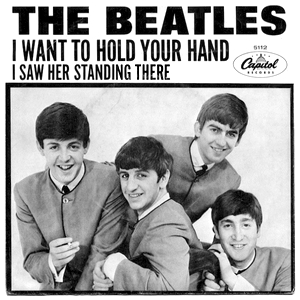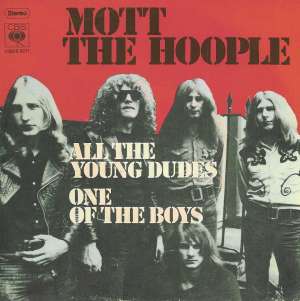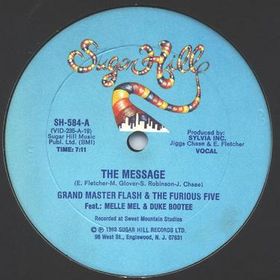Song: "I Saw Her Standing There"
Album: Please Please Me
Year: 1963
CLICK HERE TO LISTEN (will open in new tab)
Throughout the course of the entire history of music, there are a very small number of bands and individual artists who are so influential, so iconic, that they are perhaps more a part of "regular" history than exclusively to just music. These performers can be counted on a single hand, as their contributions to both music, as well as society in general, are so massive that culture itself hinged on their presence and across the planet, their names remain in legendary status. Yet it is these same groups that have been so instrumental in the development of music that it is almost impossible to discuss their greatness without incurring the wrath of their most dedicated fans for choosing any single moment over another, and there is perhaps no band with which this is more true than The Beatles. Truly a group that needs no introduction to anyone anywhere, there may be no other group that single-handedly shaped both music as well as the industry behind it as much as them, and though they had a comparatively short career, the number of different styles they perfected during that time is one of the many reasons they remain the unmatched icons that they are today. One can easily name two or three songs from any given album that are worthy of the title of "best," and yet one can make the case that to find the beginning of the modern age of rock and roll, one need look no futher than The Beatles monumental 1963 single, "I Saw Her Standing There."
From the moment the song begins, it is quite clear that there is something new going on in almost every aspect of the song, and the fast count in from Paul McCartney that opens "I Saw Her Standing There" remains one of the most exciting moments ever captured on tape. The band takes his energy and speed and comes out of the gates with a tone and attitude that, though "mellow" by today's standards, were certainly "dangerous" when compared to the other music of that era. The way in which the guitar of George Harrison rings across the track is nothing short of stunning, and one can even argue that the attitude one can hear within his playing is as punk rock as one can find given both the tone and context of the song. Along with the rhythm guitar of John Lennon, the pair created what remains one of the most recognized riffs of all time, and one can hear this as the true bridge between the older rockabilly-based sound, and the new style that "is" the more modern rock and roll approach. McCartney's bassline is equally impressive, and he quickly proves that he is as talented a musician as he is both a writer and singer. With Ringo Starr's drumming rounding out the sound, there is an overwhelming confidence that comes forth in the combined sound of the band, and it is this swagger, along with the amazingly catchy musical arrangement that has enabled "I Saw Her Standing There" to retain a status far beyond "iconic" for nearly fifty years.
However, one simply cannot discuss any work of The Beatles without bringing up their consistently brilliant vocal arrangement and lyrics, and the singing on "I Saw Her Standing There" is one of their finest moments, showing many of the bands' own influences. Paul McCartney handles nearly all of the vocals on the song, and there is an energy within his voice that seems to be in a competition with the music over which he is singing. It is this attitude that separates "I Saw Her Standing There" from much of the rest of the catalog of The Beatles, and even by today's standards, his vocal performance is far more energetic than "standard" rock songs. Furthermore, it is the way in which McCartney works the entire vocal scale that makes the performance so special, and there are few moments in music history that are as iconic as when he jumps to a brilliant falsetto during the chorus section of the song. It is in this moment where one can see the groups' clear influence from the likes of Little Richard, and much like the musical arrangement, the bridge between the old and new styles becomes apparent. The way in which the group blends together their harmonies is also one of their "calling cards," and though they are brief on "I Saw Her Standing There," they are just as impressive, and one can easily understand why songs like this were able to send live crowds into riotous frenzies.
Providing the essential final element, the lyrics, also a product of the work of Paul McCartney, are some of the most enjoyable in the entire Beatles catalog, and they prove that often times, simple words are the finest choice. Even all these decades later, the honest, direct nature of the words can still be easily applied to the world of "teenage longing," and there is perhaps no other song in history that better speaks to the idea of needing the courage to talk to a beautiful girl. Though many may not see it in such a light, songs like "I Saw Her Standing There" can be a source of courage for such situations, as the swagger and confidence that comes through in the lyrics certainly has an inspirational quality, and once again, it is this attitude that places the song in its own category. It is also the fact that in every aspect, "I Saw Her Standing There" has aged perfectly, continuing to be covered by countless artists, that proves its overall significance, and one can easily argue that there is no song that has ever achieved the level of sheer perfection that one can experience in these three minutes. From the sting of the guitars to the shake of the rhythm section to the absolutely revolutionary vocal performance, the combined work that is "I Saw Her Standing There" represents everything that there is to love about rock and roll music, and while they certainly had a massive amount of legendary singles, there are none that have had the same impact and longevity as one can experience within The Beatles unforgettable 1963 single, "I Saw Her Standing There."














